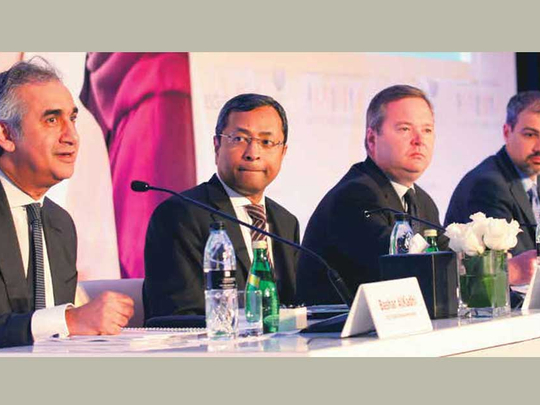
Dubai: The UAE remains the top country that most Arab youth would like to live in, the 7th annual Arab Youth survey found for the fourth year running. The Arab youth surveyed also said they see the UAE as a model country that they would like their countries to emulate.
The results of the ASDA’A Burson-Marsteller Arab Youth Survey were revealed on Tuesday during a press conference held in Dubai.
The face-to face survey, which was conducted on 3,500 Arab youth aged 18 to 24 from 16 countries by Penn Schoen Berland (PSB), aims to understand the Arab world’s dynamics through the eyes of its youth.
“Why youth? 60 per cent of the Arab world’s population is under the age of 25. The 200 million Arab youth are going to have a large role in changing the future,” said Jeremy Galbarth, CEO of Burson-Marsteller, Europe, Middle East and Africa. “We started this survey in 2008 because we understand how important it is to access data in this area, especially with the limited research done in the region. Such a survey will help policymakers make decisions,” he said.
When asked to name a country anywhere in the world where they would like to live, Arab youth, who took part in the survey, chose the UAE as their top choice for the fourth year running ahead of 20 other countries.
The United States came in second by 15 per cent. Germany and Canada followed at 10 per cent.
His Highness Shaikh Mohammad Bin Rashid Al Maktoum, Vice-President and Prime Minister of the UAE and Ruler of Dubai, tweeted about this finding saying: “These findings are not only a source of pride for us, it is also a growing experience that we lived and it is available to anyone who wants to study our journey and benefit from it.”
Likewise, when asked to think about which country they would like to emulate, almost a quarter (22 per cent) of the respondents consider the UAE as a model nation, followed by the United States (15 per cent), Germany (11 per cent), Canada (8 per cent) and France (8 per cent).
The UAE was the only Arab country in the top five choices identified by Arab youth.
“It is no surprise that the UAE came on top,” said Jordanian 20-year-old Saif Al Deen Khalil. “Most of my young relatives in Jordan want to work and live in the UAE. It is mainly because the UAE brings the best of both worlds. It has all the opportunities available in the West and at the same time, it is a Muslim and Arab country that preserves its traditions and values.”
Palestinian Mais Kanan, 23, also said it is expected that the UAE would come on top as it is one of the few Arab countries that is safe and free of turmoil.
“UAE is the country to look up to, it is flourishing and what I like the most about the UAE is that it shows Islam in a positive light.”
Unemployment: a major concern among Arab youth
Unemployment remains a key concern among Arab youth, said Jay Leveton CEO of PSB, the polling firm, which conducted the survey.
When asked to comment on how concerned they are about unemployment, the majority (81 per cent) of the youth said they are “concerned” and almost one in three (29 per cent) cited it as the biggest obstacle facing the region.
The issue is particularly worrying for youth in non-GCC countries where 84 per cent are concerned compared to 73 per cent in the six GCC states.
Only one in three (33 per cent) of youth outside the GCC are confident in their government’s ability to tackle the issue of unemployment, a significant difference compared to the GCC at 68 per cent.
The report read, “Overall unemployment rates differ significantly across the region from as low as 11 per cent in Kuwait to over 30 per cent in Morocco, according to United Nations data.”
Meanwhile, the Middle East and North Africa (Mena) needs to create 80-100 million jobs by 2020 to maintain its current unemployment rates, according to the World Bank.
Starting their own business
In the context of unemployment and future prospects, the survey posted positive trends when it came to youth’s desire to start their own business.
Nearly two in five (39 per cent) young Arabs are looking to start a business within the next five years, with technology and retail being the most popular sectors.
Leveton said Arab youth are confident that they can start their own business and this percentage is higher than any country in the world.
When asked to suggest what national governments should do to further encourage entrepreneurship, one third (32 per cent) say they should encourage affordable lending.
They cite improving available training and education (26 per cent) as the second most pressing measure followed by reducing regulation and red tape (19 per cent).








